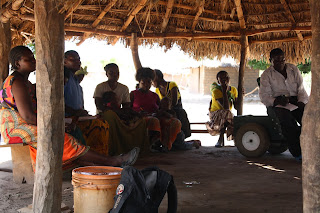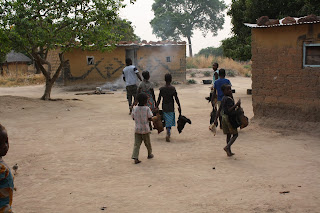Spreading information in a rural setting isn't a simple thing. What we would use in the United States like emails, flyers, and even cell phones aren't readily available in a village. The cost of these things, especially minutes (or talk-time as it's called locally) for a cell phone, are sometimes excessive.
So, the best way to do this is to tell as many people as possible - over and over. And to further that spread of information it's always a good thing to have a demonstration, where people can see firsthand how something works.
Most of the people in the communities where volunteers work are farmers that prefer to learn by seeing and doing, rather than listening and blindly believing. I can't blame them either. A lot of the things that volunteers promote sound too good to be true... and sometimes they are. This is another reason why public demonstrations are important: to openly test a new concept or design.
Sometimes the demonstrations have a few people at them, and sometimes the demonstrations get a much higher turnout than expected. This is always great - although rare.
Some volunteers do a lot of public demonstrations and then there are others, like myself, that do only one or two per month. I prefer to work in smaller settings, sometimes just in a one-on-one kind of atmosphere. Part of it is because I like getting to know the person I'm working with, then other times I find the public demonstrations to be overwhelming - it's a lot of people staring you down all at once.
One of the issues I have is that when I do hold demonstrations people show up late or not at all, which is discouraging. However, when people do come they may show up intermittently throughout a two hour period. Hardly ever is an entire group there right at the designated starting time. All of this has taught me one very important thing: always bring a book... you may be waiting for a while.
It can be hard to hold a demonstration when people are showing up randomly throughout the session. Once I get rolling I like to keep it going in a forward progression: not starting, stopping, and then restarting again.
Every volunteer is different though (I've learned that that can't be reiterated enough in Peace Corps). Some hate doing one-on-one kinds of work, which I much prefer, and others like the mass meetings. It's always interesting to me to see how other volunteers hold meetings and demonstrations with their community. What they use for incentives, what they teach on, where and when they hold the demos, etc.
When a demonstration is done well it can have a rippling effect. I once held a demonstration about making charcoal from old maize cobs, then two months after that demonstration - some 40 miles from where it was held - a man approached me and asked if I would do another demonstration like that in his community. Word travelled fast and with it - interest.
When a demonstration is done well it can have a rippling effect. I once held a demonstration about making charcoal from old maize cobs, then two months after that demonstration - some 40 miles from where it was held - a man approached me and asked if I would do another demonstration like that in his community. Word travelled fast and with it - interest.













